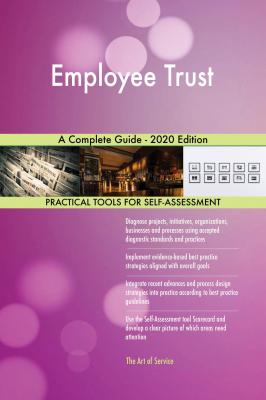Employee Trust A Complete Guide - 2020 Edition. Gerardus Blokdyk
Читать онлайн.| Название | Employee Trust A Complete Guide - 2020 Edition |
|---|---|
| Автор произведения | Gerardus Blokdyk |
| Жанр | Зарубежная деловая литература |
| Серия | |
| Издательство | Зарубежная деловая литература |
| Год выпуска | 0 |
| isbn | 9781867460459 |
<--- Score
19. Are accountability and ownership for Employee trust clearly defined?
<--- Score
20. What constraints exist that might impact the team?
<--- Score
21. What are the Roles and Responsibilities for each team member and its leadership? Where is this documented?
<--- Score
22. How is the team tracking and documenting its work?
<--- Score
23. Has the improvement team collected the ‘voice of the customer’ (obtained feedback – qualitative and quantitative)?
<--- Score
24. Are the Employee trust requirements testable?
<--- Score
25. Is there any additional Employee trust definition of success?
<--- Score
26. What are (control) requirements for Employee trust Information?
<--- Score
27. What scope do you want your strategy to cover?
<--- Score
28. Is the scope of Employee trust defined?
<--- Score
29. What are the rough order estimates on cost savings/opportunities that Employee trust brings?
<--- Score
30. What would be the goal or target for a Employee trust’s improvement team?
<--- Score
31. How will variation in the actual durations of each activity be dealt with to ensure that the expected Employee trust results are met?
<--- Score
32. How do you keep key subject matter experts in the loop?
<--- Score
33. Are customer(s) identified and segmented according to their different needs and requirements?
<--- Score
34. What is out-of-scope initially?
<--- Score
35. What information do you gather?
<--- Score
36. Who is gathering Employee trust information?
<--- Score
37. Do you all define Employee trust in the same way?
<--- Score
38. What system do you use for gathering Employee trust information?
<--- Score
39. Has the Employee trust work been fairly and/or equitably divided and delegated among team members who are qualified and capable to perform the work? Has everyone contributed?
<--- Score
40. Is the improvement team aware of the different versions of a process: what they think it is vs. what it actually is vs. what it should be vs. what it could be?
<--- Score
41. When is the estimated completion date?
<--- Score
42. Who are the Employee trust improvement team members, including Management Leads and Coaches?
<--- Score
43. Scope of sensitive information?
<--- Score
44. What was the context?
<--- Score
45. What is out of scope?
<--- Score
46. Has your scope been defined?
<--- Score
47. Is full participation by members in regularly held team meetings guaranteed?
<--- Score
48. What are the record-keeping requirements of Employee trust activities?
<--- Score
49. When is/was the Employee trust start date?
<--- Score
50. What are the core elements of the Employee trust business case?
<--- Score
51. Is the team sponsored by a champion or stakeholder leader?
<--- Score
52. What are the Employee trust use cases?
<--- Score
53. How would you define the culture at your organization, how susceptible is it to Employee trust changes?
<--- Score
54. How do you catch Employee trust definition inconsistencies?
<--- Score
55. Has anyone else (internal or external to the group) attempted to solve this problem or a similar one before? If so, what knowledge can be leveraged from these previous efforts?
<--- Score
56. Is the team equipped with available and reliable resources?
<--- Score
57. How often are the team meetings?
<--- Score
58. Is there regularly 100% attendance at the team meetings? If not, have appointed substitutes attended to preserve cross-functionality and full representation?
<--- Score
59. What information should you gather?
<--- Score
60. Is the team formed and are team leaders (Coaches and Management Leads) assigned?
<--- Score
61. How do you manage scope?
<--- Score
62. What critical content must be communicated – who, what, when, where, and how?
<--- Score
63. How do you manage changes in Employee trust requirements?
<--- Score
64. What happens if Employee trust’s scope changes?
<--- Score
65. Are required metrics defined, what are they?
<--- Score
66. What is in the scope and what is not in scope?
<--- Score
67. What knowledge or experience is required?
<--- Score
68. Are the Employee trust requirements complete?
<--- Score
69. How did the Employee trust manager receive input to the development of a Employee trust improvement plan and the estimated completion dates/times of each activity?
<--- Score
70. What is the definition of success?
<--- Score
71. Does the team have regular meetings?
<--- Score
72. What are the boundaries of the scope? What is in bounds and what is not? What is the start point? What is the stop point?
<--- Score
73. The political context:
